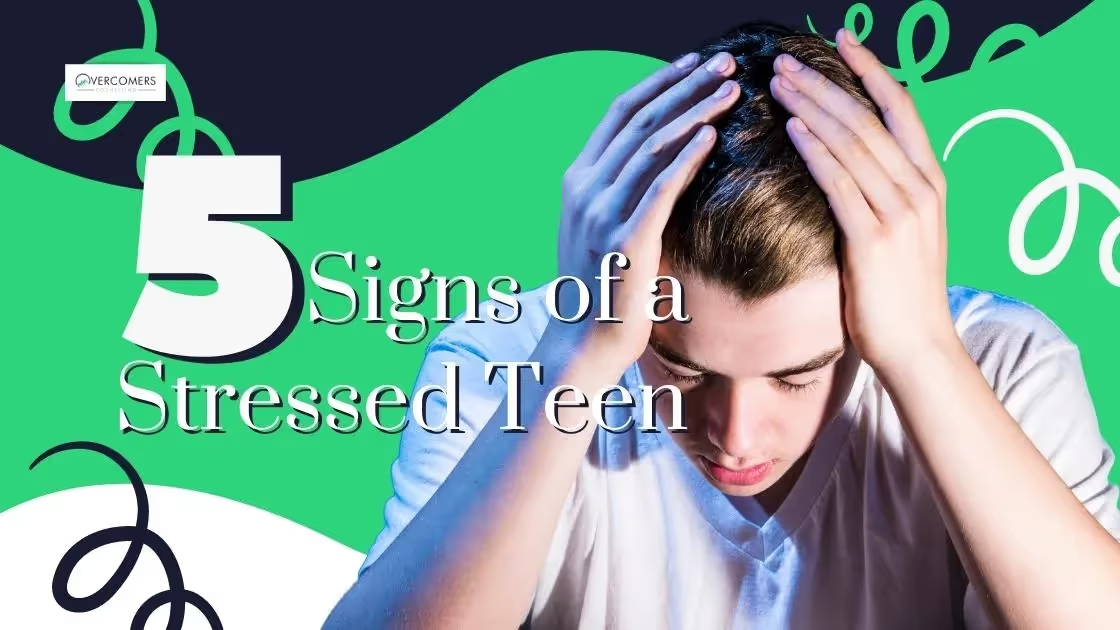We all experience the effects of stress at different points in our busy lives when trying to achieve various goals, and teens are not left out, thus causing...

We all experience the effects of stress at different points in our busy lives when trying to achieve various goals, and teens are not left out, thus causing parents to desire to know how to identify the signs of a stressed teen to help them deal with the overwhelming feelings.
When your teen is switching through intense emotions of anger, sadness, frustration, embarrassment, and anxiety, they are very likely stressed and don't know how to talk about their feelings or manage them.
Another indicator of stress is your teen consuming a lot more food or eating less than usual because they are either looking for a means to distract themselves from their worries or their worries are so overwhelming that they don't care about feeding.
Similarly, insomnia is one of the leading signs of a stressed teen because they generally love getting enough sleep; when one isn't sleeping well, there may be some events contributing to their sleepless nights.
Furthermore, teens may be escaping from their stress through the consumption of alcohol, drugs, and other substances, actions that are considered risky as they ingest these harmful substances that can impair their cognition and negatively affect their physical health.
Here's an overview of the signs of a stressed teen:
Exhibiting intense levels of emotions is one of the signs of a stressed teen, and you can help them deal with these feelings by understanding them, calming them down, and giving them ways to deal with the stress.
When they are burdened by stress and are being intense, don't try to control their emotions and immediately stop the intensity; instead, try to show them how to express the feelings appropriately without harming anyone, including themselves.
What you should control are your emotions so you can respond correctly to theirs, ensuring to calm down, take a step back mentally, and not shout at them for their natural reactions to stress.
You controlling your emotions doesn't mean you are giving in to whatever they want; instead, you don't want to escalate the situation and would rather let things die down before prescribing the consequences to their emotion if it was negatively directed at others.
Authors & Editors: Click on any image and make sure you add an ALT description
A change in your teen's eating preferences or periods may be one of the signs of a stressed teen because stress can cause people to over-eat as a form of escape from the feelings or under-eat because they don't feel good enough to care about food.
Whatever change has occurred to your teen, you can solve the issue by being intentional and encouraging healthy eating habits by telling them how awesome it is to have them eat with the family and how good eating habits positively affect their appearance and health.
Besides the positives, you can also share the dangers of dieting to get the point across, telling them how eating little food can lead to an eating disorder, compromise their health and growth, and isn't healthy for dealing with emotions.
If they are under-eating because of an erroneously perceived body image, it's your duty to talk to them about it and explain the existence of different body shapes, discouraging them from feeling bad because of their shape and imbuing them with a high dose of self-esteem.
Teenagers may experience reduced sleep, which is one of the signs of a stressed teen, with difficulty falling asleep even causing more stress because insomnia can negatively affect their mental and physical health.
You can help them improve their sleep by maintaining a sleep schedule that stipulates when to get in and out of bed, aiding them in getting a consistent routine that can always get them a good night of rest despite the day's stress.
You may also prohibit the use of televisions, computers, phones, and gaming consoles when it's time to wind down in the bedroom, as the gadgets emit light and noise that can keep your teen up at night when they should be getting comfortable sleep.
Among your bedtime practices, you should try to avoid sleep-altering behaviors such as exercising at night, which may cause your teen to stay alert, late-night meals that can cause heartburn and discomfort to the stomach, and drinking caffeine-containing substances that increase brain activity.

Generally, teens engage in risky actions that can be frustrating for parents, but they may get involved in more dangerous activities, which may be one of the signs of a stressed teen trying to escape from the overwhelming feelings in their lives.
If you see your teen engaging in risky actions such as taking alcohol and ingesting drugs, you should try not to escalate the situation to prevent a reactionary outburst from them; instead, talk to them about the family's values and how their actions don't fit in with them.
You can go on to talk about the consequences of their behavior morally and legally, the health risks involved in the practices, and the damage the manifestation of any of the risks can cause to the family.
After the talk, endeavor to stay connected to your teen and build a relationship with them, enabling them to talk to you and help smoothen the stress and also giving you the opportunity to keep a watchful eye on them.
Heightened anxiety, which is one of the signs of a stressed teen, is becoming observable in many teens because of the growing stress from high expectations, an increasingly-scary society, and the inability to live the lives of their favorite social media influencers.
As a concerned parent, it's essential that you find out the general causes of your teen's anxiety to enable you to gain an insight into their issues before you initiate a conversation with them about their stress.
Once you understand the general matters, you can have a talk with them where you discuss their stressors, listen to them about the events surrounding the stress, see the problems from their perspective, and map out methods they can use to cope with the stress.
You can help them structure their social media use and educate them about the fakeness of social media so they won't feel stressed by not living the lives they see online.
Understanding the signs of a stressed teen can help you know if the new behavioral traits of your teen are indicators of stress and how to help them cope with the stress.
The indicators of stress you should look out for in your teen include intense emotions, change in eating habits, difficulty in sleeping, risky actions, and heightened anxiety.
https://www.empoweringparents.com/article/anger-rage-and-explosive-outbursts-how-to-respond-to-your-child-or-teens-anger/
https://www.verywellhealth.com/simple-tips-to-improve-teen-sleeping-
https://www.mayoclinic.org/healthy-lifestyle/tween-and-teen-health/in-depth/teen-eating-disorders/art-20044635
https://www.familyeducation.com/the-warning-signs-of-teen-burnout
https://raisingchildren.net.au/teens/behaviour/behaviour-questions-issues/risky-behaviour
https://www.healthychildren.org/English/health-issues/conditions/emotional-problems/Pages/Anxiety-Disorders.aspx
You can teach your child persistence by modeling the behavior yourself, encouraging them to take risks, setting goals and tracking progress, praising effort, and providing support and guidance.